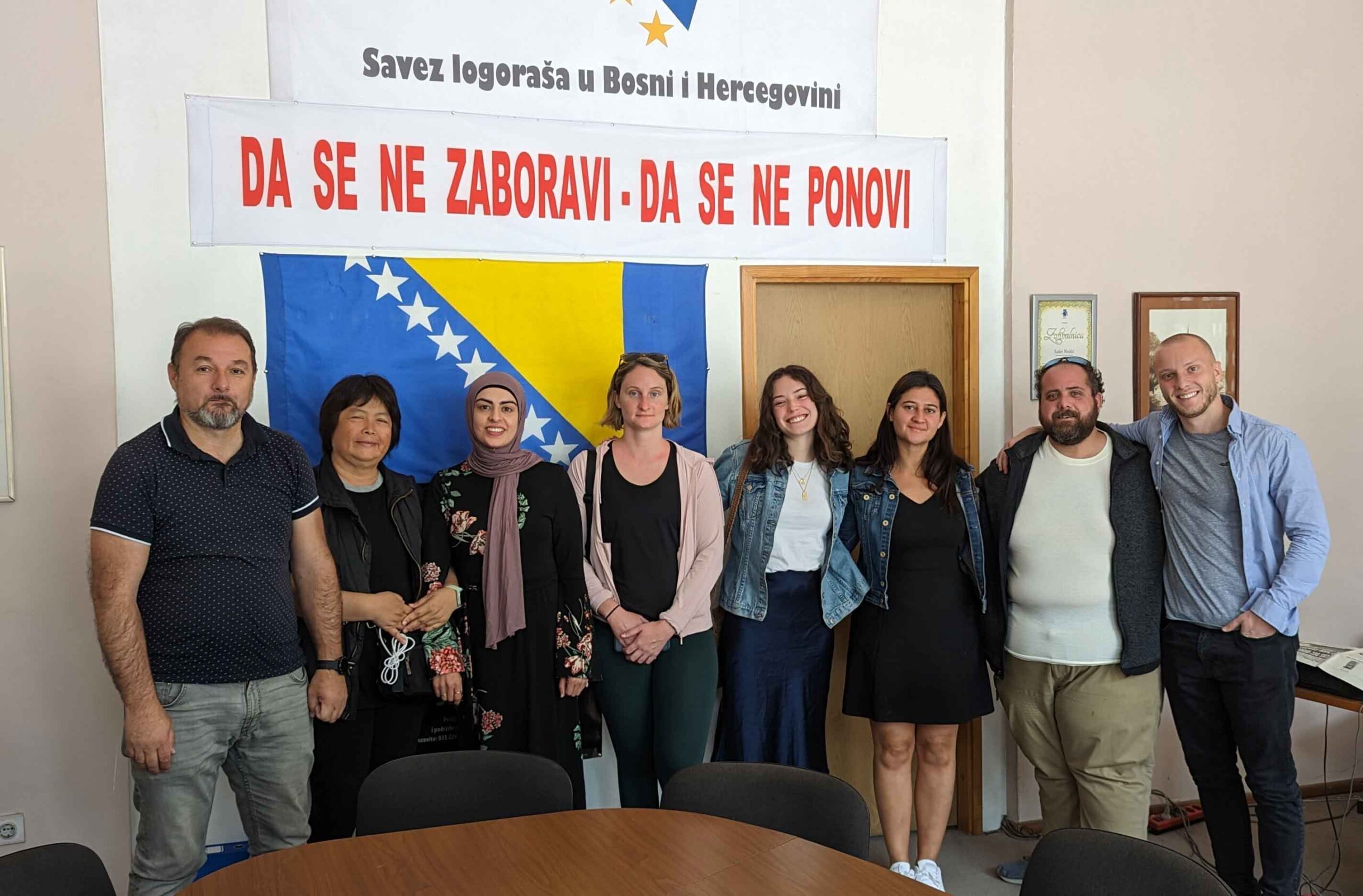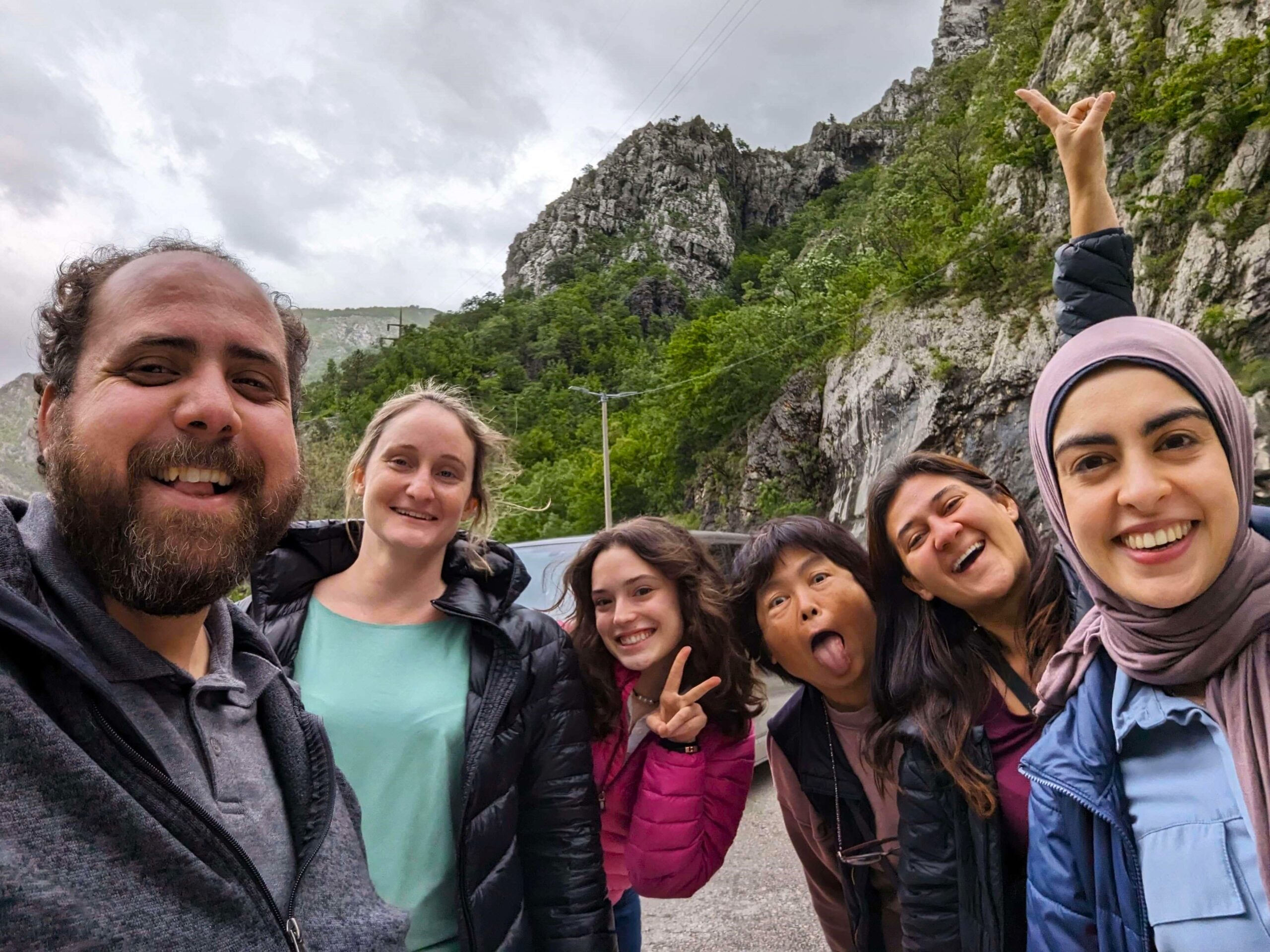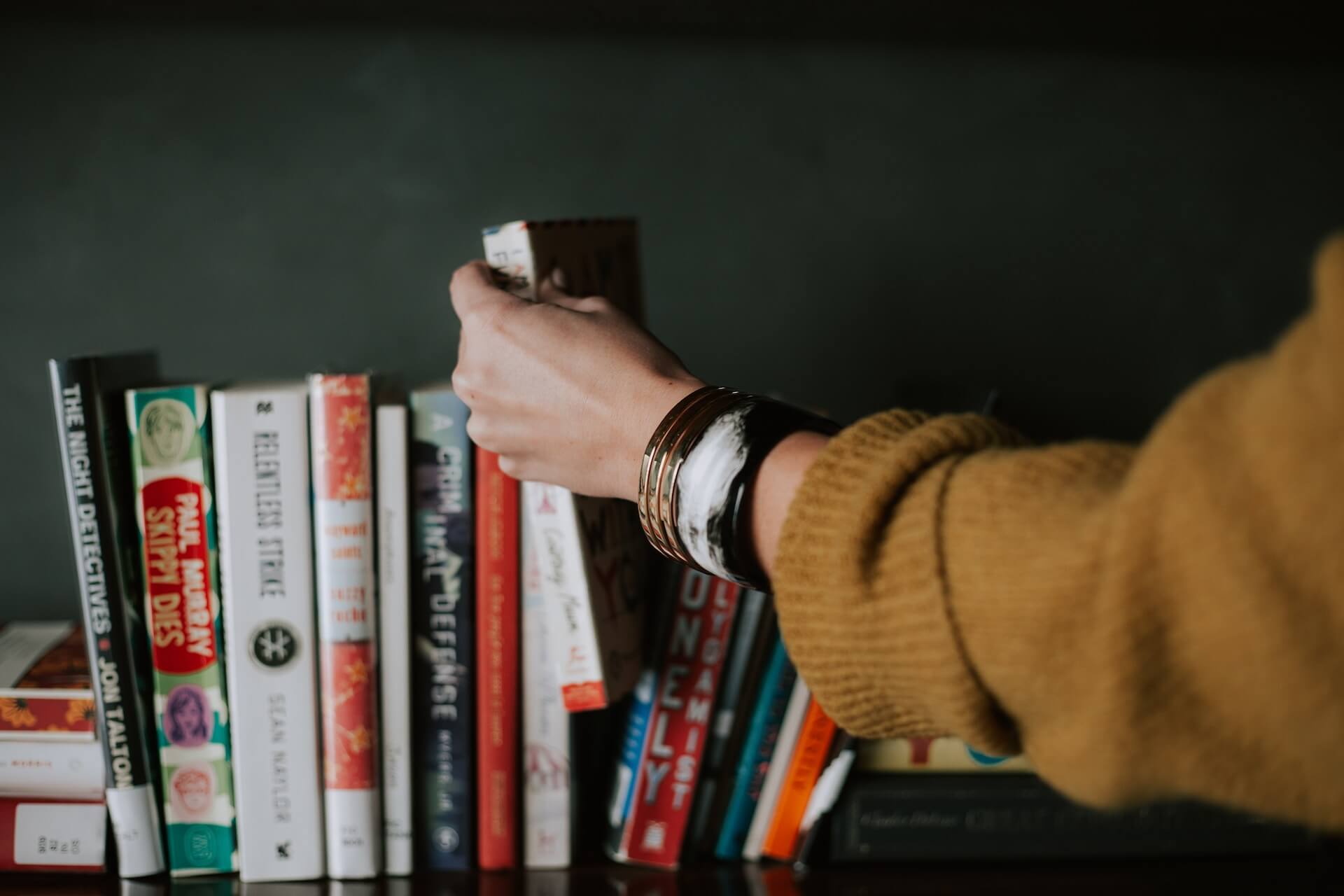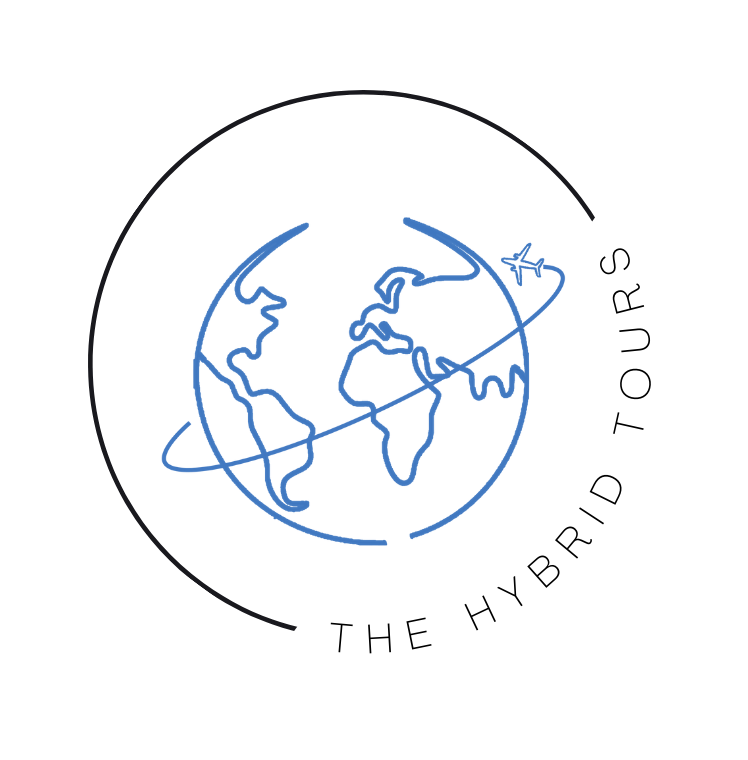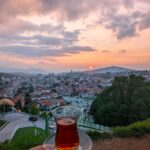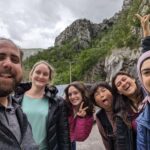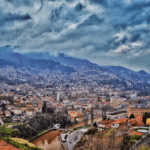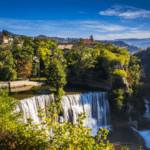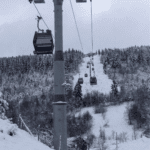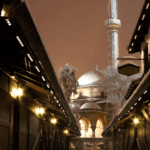Peace is the only alternative – learning about concentration camps and the siege of Mostar with Emir Hajdarovic
It was a privilege to meet with Emir Hajdarovic, the President of the Association of Former Prison Camp Inmates in Mostar during our last group trip. Here is more information about the meeting.
During our latest Hybrid Tour of Bosnia, we met Emir Hajdarovic, President of the Association of Former Prison Camp Inmates in Mostar (Udruženje logoraša Mostar). The Association currently has over 2000 registered members, which is around 20% of the total population of people who were forced into concentration camps. We spoke to Emir about the concentration camps run by Croat nationalists around Mostar during the Bosnian Genocide and how survivors continue to fight for justice nearly 30 years later.
The questions below were asked by us and our participants.
Were there efforts to reintegrate concentration camp survivors back into society?
After the detainees left the camps, they had to deal with their traumas by themselves. They had no assistance from society. We as victims suffered trauma and mental health problems and we received no assistance from society. Almost 50% of the detainees have passed away.
It was difficult for survivors to interact with society after they were released. They were forced to fight for their own rights, the state didn’t do anything for them. Due to the complex political situation in Bosnia and Herzegovina (BiH), the people who committed the atrocities and crimes were protected by Serbia and Croatia respectively. The position of the victims was and continues to be decided by the same people who committed the atrocities and war crimes against them. They felt there was no need to integrate survivors back into society.
How did the detainees pass away? Was it a direct result of the trauma they suffered in the concentration camps?
There are two categories, the first group died as a direct result of the torture they suffered in camps after their release and the second group died because of natural causes and the trauma they suffered. Most of the detainees are now over 60 and it’s already been 30 years since the HVO (Croat nationalists) formed the camps. HVO formed the camps one year before the Serb nationalists did.
When were people taken to the concentration camps and did they receive any support or justice after they left?
During the siege of Mostar, part of the city was destroyed and surrounded by HVO. An area of the city, around 10km in length and 300m wide was under siege. People weren’t only detained in Heliodrom, which was located only 5km outside the city, but the people under siege were in a different sort of concentration camp. They had no access to food, electricity, water – nothing. There were 60,000 people living under siege in terrible conditions.
There were quite a few camps aside from Heliodrom and some of them were privately owned. There were private concentration camps in the western part of Mostar. Bosniaks who were in the western part of Mostar were mistreated if they didn’t agree with the policies of the Croat forces. They were sent to camps, tortured, persecuted, and maltreated. The Croat forces were convicted of this in the ICTY trials.
There were no organised efforts by the state or society. Survivors were left to deal with it themselves.
54 people died as a direct result of the trauma they suffered in the camps and many more were wounded. They were all subjected to physical and mental torture. Some of them were even taken to the front lines where the Croats would dress them in military uniforms to try to provoke fighting between the parties by staging assaults.
I was 21 when I was taken to Heliodrom, but there were also 14-15-year-old children who were also in the camps. Most survivors suffered and continue to suffer from PTSD. We received no psychological assistance. There were no organised efforts by the state or society. Survivors were left to deal with it themselves. Survivors were not given any rights under the law.
There were no laws passed regulating the rights of the victims.
10,000 inhabitants passed through the concentration camps in Mostar and 20,000 in Herzegovina. They were subjected to numerous physical and mental torture. Almost 30,000 Bosniaks were expelled from Mostar by Croat forces because they wanted to change the demographics of the city. These people are now displaced across the world, they are everywhere.
All this misfortune stemmed from the policy of the then Croatian President Tuđman. He had an idea he liked to call human resettlement which is just a watered-down way of describing ethnic cleansing. He wanted to restructure the population. Unfortunately, this idea persists to this day. Croatia still has aspirations towards BiH.
We don’t accept the label of ‘victims’, we aren’t weak, and we will continue to fight for our rights and those who were oppressed then and now.
The Croatian policy now is still almost the same except the means are more sophisticated and subtle. Our organisation is fighting to get recognition for all detainees regardless of their background and advocate for all perpetrators to face justice. We are dissatisfied with the court rulings, especially in Mostar where no significant sentences have been given.
When the survivors left the camps, they weren’t satisfied with how the international community accepted criminals as people to negotiate with. These criminals are still holding political positions, including some of the most important political positions in BiH. The president of the HDZ used forced labour in camps but he’s still in power. We don’t accept the label of ‘victims’, we aren’t weak, and we will continue to fight for our rights and those who were oppressed then and now.
Was anything done on a local or state level against war criminals?
In general, we are satisfied by the tribunals and cases judged by the Hague but not the decisions made by the local courts and judiciary. It’s been three decades, and only 1 minor court sentence was imposed after the camps were formed. The case for Heliodrom where I was detained hasn’t even started yet.
Many people who witnessed the torture in the camps have already died and it’s hard to find people to testify. Those who are alive find it difficult to appear before the courts and testify. The criminals who committed these war crimes are still present in society across BiH. The delays in holding hearings for these cases were done purposefully and intentionally so people can forget what happened here. The buildings that were once camps are now being turned into educational places for the Croat forces so people can forget all the atrocities that happened there. New generations are coming, and they will forget all the war crimes that happened there.
How are you helping the registered concertation camp survivors?
We are trying to encourage survivors to write books so the atrocities they faced aren’t forgotten. We also encourage them to appear in court, to fight for their rights and to tell the truth about what they experienced. Politicians are not inclined to help survivors because their testimonies are a problem for them. If survivors write these books and appear in courts to show the true picture of what happened in the concentration camps and how many people were detained, it would not be favourable for politics.
5,000 people are still alive but are afraid to come forward. As I mentioned, any assistance from beneficial sources is minor and we need financial funds for our activities, this is why we can’t help survivors financially. However, we provide some psychological assistance to help them cope with everything that they went through.
None of the Croatian leaders have accepted the ruling, they need to accept what they did here.
One thing we are also currently trying to do is adopt a law on all torture in the camps against people of all religions. In BiH, we have 3 different politics at the state level. Three different versions of what happened. In comparison to the Serbs and the Croats, Bosniaks have no rights secured by institutions because the other two are strongly against this. They want to stop Bosniaks from getting any rights. No medical help was even offered to survivors.
In 2017, the ICTY sentenced Bosnian Croat wartime military and political leaders to 111 years in prison for taking part in a joint criminal enterprise aimed at forcibly removing Bosniaks from Herceg-Bosna in an attempt to create a ‘Greater Croatia’. None of the Croatian leaders have accepted the ruling, they need to accept what they did here.
Which political party has the majority, and do they promote inclusive policies or continue to push the divide?
According to the latest census, BiH is over 50% Bosniak, 30% Serb and 15% Croat. At the beginning of the war, Bosniaks and Croats fought together but in 1993 the Croats attacked Bosniaks and broke their agreement to work together, and they allied with the Serbs against Bosniaks instead. When the 1995 Dayton Peace Agreement was drawn up by the US, they made the Croats and Bosniaks reconcile. The areas which had been taken over by the Republic of Croatia and the parts which were under siege or occupation by Serb forces were handed over and included as part of the Federation of BiH. However, the Serbs and Croats are still against the Bosniaks. It’s like a chessboard, the Dayton Agreement never resulted in anything good.
What is very visible to us is the international community recognising and accepting these war criminals. They consider themselves eligible to hold talks with and want to cooperate with them.
Croatian and Serbian leaders and their policies support the Bosnian Croat and Bosnian Serb politicians. They still have territorial aspirations towards BiH, this hasn’t changed. They’ve had these aspirations for over 100 years. The only obstacle is Bosniaks, who are mostly Muslim, as the predominant population.
What is very visible to us is the international community recognising and accepting these war criminals. They consider themselves eligible to hold talks with and want to cooperate with them. By considering them co-partners, they are rewarding them for what they’ve done in the past. It goes beyond reason, but politics has never been about reason. These politicians are stoking interethnic clashes and disputes. They are trying to prove multi-ethnic states like BiH aren’t possible and the international community is helping them with their intention.
It is our desire for people in BiH to live normal lives with the rule of law, where all individuals are free from discrimination, so no one goes through what we went through.
How did the divide between the religions begin?
It’s a complex issue, 150 years before the state of BiH there was the medieval Bosnian Kingdom. Everyone in Bosnia is Bosnian but we have different religions, like in the US. The aspirations of Croatia and Serbia as states focused on converting Bosnian Catholics and Bosnian Orthodox into Serbs and Croats, even though that’s not what they were originally. They wanted to assimilate them into their own countries.
Are the people responsible for the crimes in BiH or Croatia?
Some of the criminals are in Bosnia and some are in neighbouring countries. When BiH imposed sentences for crimes committed during the Bosnian Genocide, people with dual citizenship fled to Serbia or Croatia and they are still being protected by politicians, politics, and the state. The criminals aren’t being handed over to the authorities to carry out their sentences, they aren’t being extradited. These criminals are being protected by Serbia and Croatia.
Are there any books written by survivors in English and how can people help support your organisation?
We are encouraging the survivors to write books to document what they experienced so it’s not lost. One of these books is Wounded I Am More Awake: Finding Meaning After Terror by Dr Esad Boskailo and Julia Lieblich. Aside from this, any assistance is welcomed. We are registered as a legal entity and if you would like to donate to us, please get in touch via email. We aid all organisations in BiH promoting peace, fighting for their rights, and promoting coexistence and peace. This is the society we want, a society where coexistence is normal in BiH.
What would you like people to know about BiH and what would you like them to learn from the Bosnian Genocide?
BiH is a beautiful country with a turbulent history, but all countries have turbulent histories and must work through this. Despite this, BiH is a big country for everyone who loves this country as their own. We don’t want the US to view us as a ‘case’. We want the international community, especially the US, not to accept the division of BiH and they shouldn’t encourage our neighbouring countries to continue their hostile policies in BiH. They should send a clear message that BiH cannot and should not be divided.
What happened in BiH shouldn’t happen again, no one should encourage war. The people of BiH will survive no matter what but we want peace. Peace is the only alternative.

